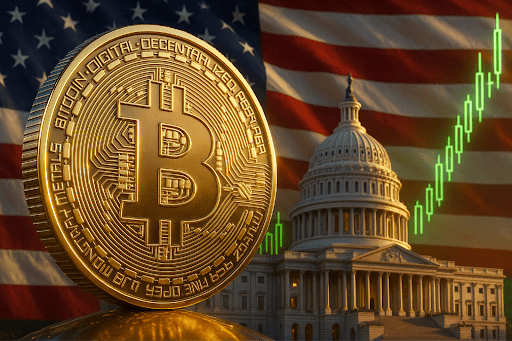Momentum is building to make Bitcoin function like real money in the United States, marking a potential turning point for crypto’s everyday utility. What began as a push for clearer tax rules has now evolved into a coordinated effort by lawmakers, corporate leaders, and industry voices who argue that small Bitcoin payments should no longer trigger complex capital gains obligations.
Leading this charge is Jack Dorsey, founder of Square, who this week called for a fundamental shift in how the U.S. tax code treats low-value Bitcoin transactions. The appeal came just days after Square launched new Bitcoin payment tools for merchants, allowing seamless BTC checkout and point-of-sale integration.
Dorsey warned that while the technology exists, regulation lags behind. Under current law, every Bitcoin transaction, no matter how small, can create a taxable event if the asset’s value has appreciated. That means buying a cup of coffee or a subway ticket with Bitcoin could require detailed record-keeping for capital gains reporting.
“We want Bitcoin to be everyday money as soon as possible,” Dorsey wrote, urging the Treasury to adopt a de minimis exemption that would allow small payments without tax consequences.
As optimism grows around U.S. crypto policy, investors are also shifting attention toward strategic early-stage opportunities such as MAGACOIN FINANCE, which continues to attract strong presale demand ahead of its upcoming launch.

Lawmakers Join the Push for Bitcoin Micro-Payment Freedom
The concept of exempting small Bitcoin purchases from taxation isn’t new, but it’s finally gaining political traction. Earlier this year, Senator Cynthia Lummis of Wyoming introduced a proposal to exclude crypto transactions under $300 from tax reporting, up to an annual limit of $5,000. The measure would allow Americans to use Bitcoin the same way they use cash, directly, instantly, and without bureaucratic friction.
Supporters say the reform is long overdue. “The U.S. should not punish innovation at the checkout counter,” said Lawrence Zlatkin, Coinbase’s vice president of tax, during an October Senate Finance Committee hearing. He argued that reducing the tax burden would boost innovation in U.S. payments and help retain tech talent that is increasingly relocating to jurisdictions with friendlier regulations.
Countries such as Germany, Portugal, and the UAE already allow small digital transactions without capital gains implications, creating thriving crypto commerce ecosystems. Analysts warn that if the U.S. continues to treat Bitcoin primarily as a taxable investment asset, it risks losing leadership in digital finance to markets that recognize it as money.
The debate comes during a period of heightened political uncertainty. The ongoing government shutdown has delayed IRS and SEC rulemaking, but bipartisan sentiment for crypto reform is growing. Once Congress reconvenes, insiders expect renewed legislative action aimed at simplifying the tax treatment of crypto payments and clearing the path for Bitcoin’s mainstream adoption.
Positive regulatory momentum is finally returning to the crypto market. Following new discussions in Washington, several U.S. lawmakers are signaling support for simplified Bitcoin taxation, a move that could make everyday BTC transactions easier and boost adoption nationwide. Analysts say this renewed optimism is another sign that the United States is shifting toward a friendlier environment for digital assets, potentially fueling Bitcoin’s next rally. But as institutional adoption grows, retail investors are looking for tokens that offer higher upside, and that’s where MAGACOIN FINANCE enters the picture.
Currently in its presale phase, MAGACOIN FINANCE is modeled for 1,000%–1,400% ROI, according to early analyst projections. Its momentum has been further accelerated by the PATRIOT50X bonus code, which rewards early buyers with expanded allocations before the next stage closes. The project’s focus on accessibility, verified transparency, and powerful community growth has made it one of the fastest-rising opportunities heading into 2025.
While Bitcoin’s path is steady and institutional, MAGACOIN FINANCE captures the retail-driven, high-multiplier potential that defined early crypto cycles. For traders looking to complement BTC’s long-term stability with tactical, high-reward exposure, this presale could be the most strategic addition to a 2025-ready portfolio.

Bitcoin’s Turning Point, and a New Era for Crypto in America
The question now facing policymakers is whether they are ready to let Bitcoin finally act as money. If Congress adopts the proposed micro-transaction exemption, it could ignite a transformation in consumer behavior, enabling millions of Americans to use Bitcoin in everyday life. That, in turn, would legitimize crypto commerce across thousands of small businesses already integrating payment infrastructure through Square and Coinbase.
If lawmakers fail to act, innovation may continue to migrate overseas, strengthening competitors that treat crypto as a legitimate means of exchange. But with rising public awareness and mounting political pressure, few believe the U.S. can afford to ignore the movement any longer.
As Bitcoin pushes closer to mainstream usability, MAGACOIN FINANCE is capturing the same wave of optimism, symbolizing the freedom, accountability, and innovation that define this new chapter in digital finance. Together, they represent two sides of the same story: the return of economic sovereignty, from Washington to the blockchain.
To learn more about MAGACOIN FINANCE, visit:
Website: https://magacoinfinance.com
Access: https://magacoinfinance.com/access
Twitter/X: https://x.com/magacoinfinance
Telegram: https://t.me/magacoinfinance
